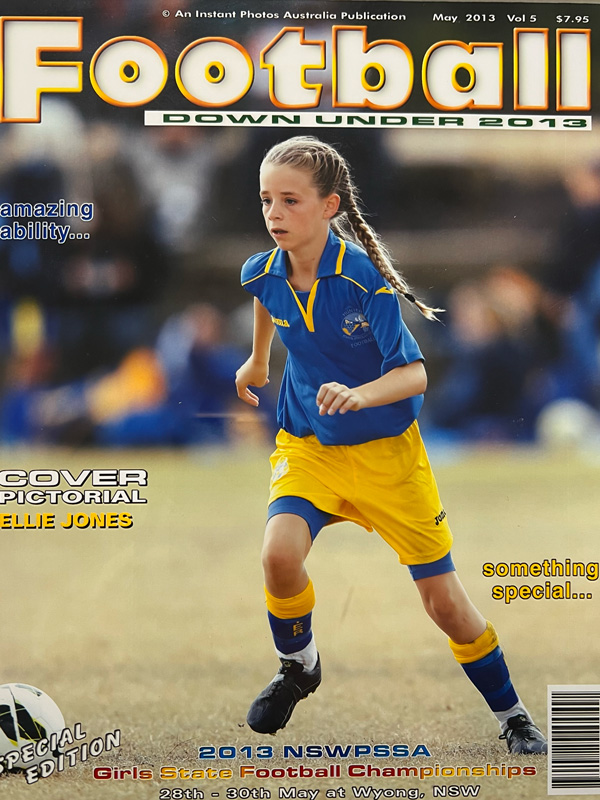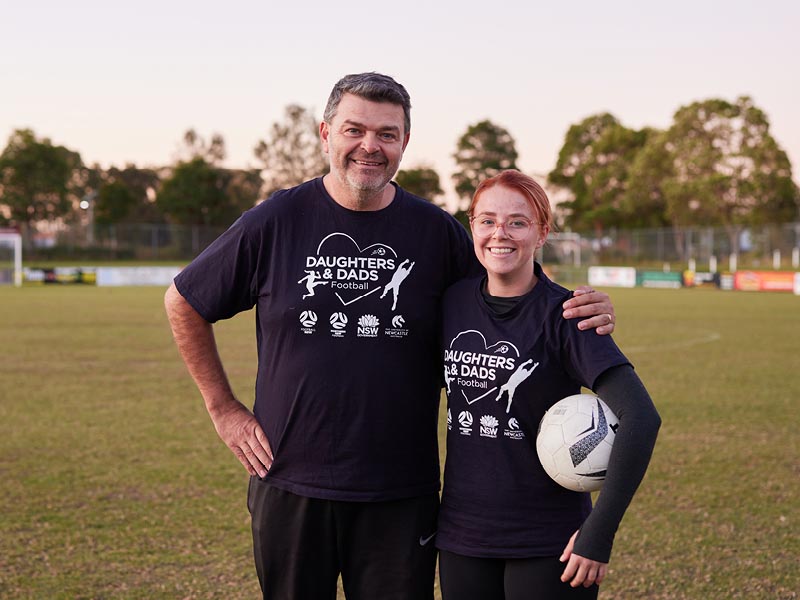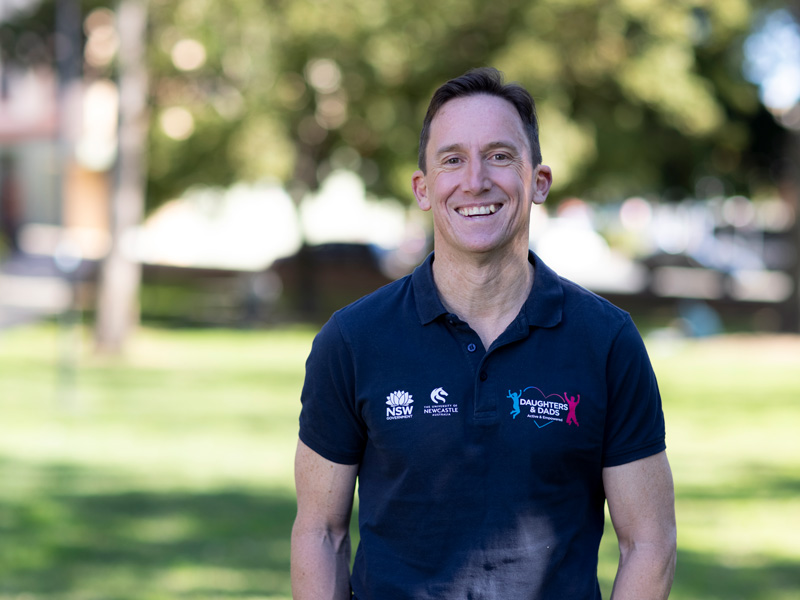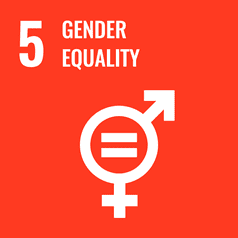Brad Jones stood stunned on the sideline of a regional football pitch in Newcastle, his mouth open in shock at what he’d just heard.
Cheers were ringing out from the crowd around him in celebration of the friendly mixed football game in which enthusiastic six- and seven-year-old players were having fun and finding their feet – their faces ruddy with effort but alight with enjoyment.
Suddenly, the supportive buzz was pierced by a venomous voice which rang out across the pitch.
The words smacked the face of their target – Brad’s seven-year-old daughter, Ellie.
“Put a skirt on and go back to netball,” the voice spat at her.
Up until this point, Ellie (pictured age 11) had been playing an incredible game. Already showing skill far beyond her years, she’d been expertly defending against the opposition’s superstar striker.
She visibly deflated in response to the verbal attack.
“Put a skirt on and go back to netball,” the voice spat at her.
Brad turned around to identify the heckler. The grandfather of the out-played striker was unable to hide his frustration and jeered again.
Furiously searching the faces around him for support, he felt outrage as parents and onlookers remained mute. A sympathetic headshake and shrug from the opposition’s coach wordlessly relayed ‘there’s nothing we can do’.
Run like a girl
The Daughters and Dad's game-changing program is revolutionising female participation in sport.
Ellie Jones remembers the same incident. Playing with the boys had never struck her as unusual until that match.
“On the pitch, my dad always treated me and my sister like footballers – never like girls. I’d never felt out of place playing sport.
“There was a definite lack of female representation on TV, in magazines and stuff back then, but because I had such a supportive dad, I think that was the first time I had my eyes opened to that [gender bias] and it was shocking that was what people thought,” she says.
Now aged 21 and a boasting a gilded career in high grade football, Ellie’s passion for the sport always prevailed, but that’s not to say she didn’t question her direction along the way.
“Our team has been kicked out of change rooms half-dressed because the boys needed to get ready; We’ve been assigned coaches who weren’t deemed ‘good enough to coach the boys’,” she lists.
“Just a couple of years ago at a match put on for International Women’s Day, we had someone in the crowd abusing a teammate for being ‘too big to play the sport’.
“Of course, I’m older now, but my heart breaks for the young girls starting out who might come up against these things without the support I had.”
In comparison with their male counterparts, studies indicate that girls enter sport on average two years later and drop out of sport six-times faster. By the time they enter high school, less than one per cent of girls have mastered all the fundamental sport skills such as kicking, bouncing, catching, striking and throwing.
“Factor in peer pressures, body image and engrained gender biases – it’s very easy for girls to give up playing sport,” she sighs.
It’s a statistic that contributed to the Jones’ pledge.
girls enter sport on average two years later and drop out of sport six-times faster [than their male counterparts]
 As the proud coach of Newcastle-based youth girls' football team Broadmeadow Magic, Ellie dedicates her spare time to nurturing the next generation of female football players, working hard to ensure they are equipped to tackle the same challenges she faced.
As the proud coach of Newcastle-based youth girls' football team Broadmeadow Magic, Ellie dedicates her spare time to nurturing the next generation of female football players, working hard to ensure they are equipped to tackle the same challenges she faced.
And she’s not alone in her efforts. Still right beside her, in solidarity, stands her dad.
At the same club, Brad Jones wears his role of Youth Girls’ Technical Director as a badge of honour – a role he conceptualised with his own daughters in mind to “ensure every girl at the club has an experience that makes them turn around say, ‘next year, I'm playing football again’.”
The unique relationship between fathers (or father-figures) and their daughters is often undervalued and remains under-researched.
However, intensive investigation into this connection is underway on the same sporting pitches Brad and Ellie are tackling gender stereotypes.
Ditch the cliché of a sterile lab with microscopes – these experiments are characterised by gleeful shrieks and hearty laughs.
The Daughters & Dads program is the brainchild of Professor Phil Morgan from the University of Newcastle’s School of Education.
A renowned physical activity expert, Phil has conceptualised a first of its kind initiative aimed at nurturing the unique relationship between fathers and their girls.
“Research suggests that up to 70 per cent of fathers only see themselves as an ‘extra set of hands’ when raising their daughters and discount their role in fostering their daughters’ physical activity behaviours and social-emotional wellbeing,” Phil explains.
“But we know that a strong connection between dads and their daughters is associated with a huge array of enhanced social-emotional, educational and physical outcomes for girls including better confidence, self-esteem, resilience and sporting ability.”
And the connection is a unique one.
“Dads typically bond with their children through an ‘activation relationship’ characterised by physical play that is stimulating, competitive and fun, usually through rough-and-tumble or sports skills,” Phil says.
"We know that a strong connection between dads and their daughters is associated with a huge array of enhanced social-emotional, educational and physical outcomes for girls.”
“These forms of play have been shown to improve children’s physical confidence and competence which impacts on their social-emotional well-being and sports participation.
“However, unfortunately, from age one, the activation relationship changes. Fathers are less likely to involve their daughters, compared to their sons, in this important physical play. As the years progress, they report they struggle to motivate their daughters to be active with them and try different sports.”
Addressing the issue by harnessing this characteristic style of play, Phil and his team developed a world-first lifestyle program grounded in physical activity with embedded evidence-based parenting education.
The Daughters & Dads programs comprise rough and tumble play, sports skills (multi-sport, cricket, basketball and football) and both dads-only and joint ‘empowerment’ sessions where a facilitator leads the participants through content including ‘pinkification’, or the engrained gender biases they might not notice every day.

Rough and tumble is proven to build relationships and enhance learning

Daughters & Dads soccer session

A participant practicing her technique

The sessions build a sense of camaraderie and excitement

Fathers come away seeing the unique role they can play in their daughters' lives
A silent sea of bodies stares unblinking at a screen in a football clubhouse filled with tables and chairs. The dads, purposefully dressed in pink, and their daughters, dressed in blue, are part of the most recent Daughters & Dads cohort.
The pairs watch a video called ‘how to run like a girl’, in which girls and young women are asked to demonstrate their ideas of the video’s namesake. In isolation from one another, the adult interviewees instantly begin to flail around, prancing on tip toes and flapping their arms.
Back in the clubhouse, furious seven-year-old daughters watching stand up in the crowd. Surrounded by their peers, they yell outrage at what they’re seeing.
furious seven-year-old daughters watching stand up in the crowd. Surrounded by their peers, they yell outrage at what they’re seeing.
The video on screen then cuts to the young interviewees, who are asked the same question. Their expressions instantly shift to determination. They raise their arms in a classic sprinters’ stance and begin to lift their knees with expert control as they burst into action.
“It’s just one example, but our goal is to empower girls by developing the critical thinking skills to spark awareness of gender inequities and know how to deal with it,” Phil (pictured) explains.
 “They learn to ‘smirk on the inside’ or question it and speak up. We want them to recognise when something isn’t fair or false and have the support of their dads to address it. They learn that their opportunities in life are not defined by their biological sex.
“They learn to ‘smirk on the inside’ or question it and speak up. We want them to recognise when something isn’t fair or false and have the support of their dads to address it. They learn that their opportunities in life are not defined by their biological sex.
“These stereotypes are so prevalent in the lives of girls and women at school and in the community. Girls are also uniquely marginalized in sports and exercise contexts and bombarded with pervasive messages that value them more for how they look than who they are and what they can do.
“But you tell a seven-year-old to ‘run like a girl’ and she’ll run powerfully and with purpose – just like any other kid.”
Powerful. Purposeful. These are just some of the words Phil’s team encourages the fathers to adopt, replacing things like ‘pretty’.
“It’s not to say to the dads ‘don’t use those words’ – just to consider the message they’re conveying. Words like brave, strong and powerful are really good at instilling confidence in children and we need to bring balance to the types of words and opportunities we provide our daughters.”
A father of three daughters, Phil has first-hand experience in the approaches he now shares with others.
“We found all programs were marketed towards, and only engaged, mums or parents in general, but that a lot of dads weren’t aware of the challenges young women might face,” he says.
“We can say ‘go girls, be strong, get out there’, but send them out into hostile territory without preparing them for consequences as girls where they face a whole range of biases and stereotypes.
"you tell a seven-year-old to ‘run like a girl’ and she’ll run powerfully and with purpose – just like any other kid."
“If you don’t have the resilience, persistence or critical thinking skills to know how to address that, then you’re setting them up to fail.”
Since its launch in 2015, more than 4500 daughters and dads have been through the program, with 554 facilitators trained to deliver the program, and collaborators across the world tailoring its content for their own citizens in the UK, Europe and South Africa.
Laden with accolades, the Daughters & Dads program now boasts partnerships with NSW government and numerous major sporting organisations as an innovative approach to increasing female participation in sports.
Randomised controlled trials assessing the program’s impact have proven it invaluable.
The benefits of Rough & Tumble play
So much so, the University of Newcastle has embedded Daughters & Dads facilitator training into its Bachelor of Education. The goal is to equip its future teachers with the ability to identify engrained gender bias and implement effective physical activity programs in school settings.
“Improving teachers understanding of gender equity and providing opportunities for girls to be empowered through sport is a priority in schools,” Phil says.
“It’s still early days, but we’re currently conducting market viability research with a view to commercialise the program. We want to ensure anyone, anywhere can benefit from the content we’ve created.”
"Words like brave, strong and powerful are really good at instilling confidence in children..."
As the thousands of fathers can attest, it’s a small shift in their awareness which reaps immeasurable reward.
“A unique element of Daughters & Dads is promoting the dads as agents of change. They’re suddenly able to see themselves as having a key role to play in their daughters’ lives.”
Years before Daughters & Dads was formally conceptualised, Brad Jones was subconsciously playing this role for his own daughters. But it was as a Bachelor of Education student, listening intently to a lecture Phil delivered, that a switch flipped.
“As I heard more detail about the program, I could instantly see the benefits,” he recalls.
Encouraging Ellie to undertake the elective as part of her own studies, the pair decided to undertake facilitation training themselves.
“I knew it was something Ellie and I would love to do together. We have such a unique working partnership and experience with football, both as players and coaches, that I knew we could offer that support to other father/daughter duos.”
14 years after an unpleasant heckle at a bright-eyed seven-year-old footballer playing her heart out, Ellie and Brad still stand united on the sidelines of a sports pitch.
In the chilly night air, Brad leans over and proudly gives Ellie’s shoulder a squeeze as she shouts encouragement at excited girls tackling a football from their enthusiastic dads.
“As a coach, I am constantly reminded by my girls how important it is to have a positive role model and an advocate willing you to be brave and persevere,” Ellie explains.
“I’m really lucky in that my dad has played that role for me, and now I get to encourage other fathers to be that same support for their daughters.”














